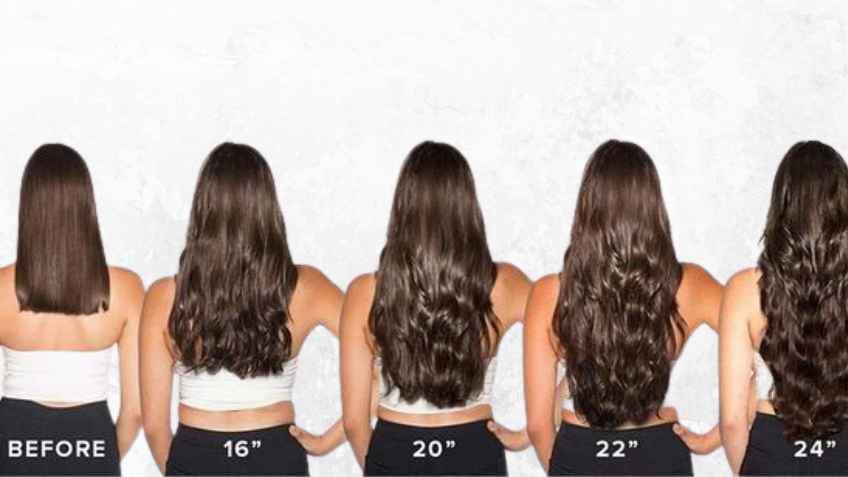
Many people desire longer, healthier hair and wonder how to accelerate its growth. While genetics play a significant role in hair growth rate, several factors can influence and potentially speed up the process. Proper nutrition, gentle hair care practices, and scalp health are crucial elements in promoting faster hair growth.
A balanced diet rich in protein, vitamins, and minerals supports hair health from within. Foods like eggs, leafy greens, and fish provide essential nutrients that nourish hair follicles. Regular scalp massages stimulate blood circulation, potentially encouraging hair growth. Gentle brushing and minimizing heat styling can prevent breakage and damage, allowing hair to grow longer. Some individuals find success with plant-based hair growth serum that contain natural ingredients to support healthy hair growth.
Key Takeaways
- A nutrient-rich diet supports hair growth from the inside out
- Gentle hair care practices prevent damage and breakage
- Scalp health and circulation play a vital role in hair growth
Optimizing Nutrition for Hair Growth
Proper nutrition plays a crucial role in promoting healthy hair growth. A balanced diet rich in specific nutrients can strengthen hair follicles and support the growth cycle.
The Role of Diet in Hair Health
Protein intake is essential for hair growth, as hair is primarily made of protein. Include lean meats, fish, eggs, and plant-based proteins in your diet. Healthy fats, especially omega-3 fatty acids found in fatty fish and nuts, help nourish hair follicles.
Iron-rich foods like spinach and lentils prevent hair loss associated with iron deficiency. Antioxidants from fruits and vegetables protect hair cells from damage. Biotin, found in eggs and nuts, supports keratin production.
Zinc, present in oysters and pumpkin seeds, aids in hair tissue growth and repair. Vitamin E, abundant in avocados and almonds, improves scalp circulation. Sweet peppers provide vitamin C, which supports collagen production for stronger hair.
Addressing Deficiencies with Supplements
While a balanced diet is ideal, some may benefit from targeted supplements. Hair growth vitamins often contain biotin, zinc, and vitamin E to support overall hair health. Keratin supplements can improve hair strength and elasticity.
Omega-3 supplements may help if fatty fish consumption is low. Iron supplements can be beneficial for those with diagnosed deficiencies, but consult a healthcare provider before starting.
Vitamin C supplements support collagen production and iron absorption. Be cautious with supplement dosages, as excessive intake can sometimes lead to adverse effects. Always choose high-quality, reputable brands for dietary supplements.
Effective Hair Care Practices
Proper hair care techniques can significantly impact hair growth and overall health. By focusing on protection and selecting the right products, you can create an environment conducive to faster hair growth.
Protecting Hair from Damage
Gentle handling is crucial for preventing hair breakage. Use a wide-toothed comb to detangle wet hair, starting from the ends and working up. Avoid rubbing hair with a towel; instead, gently squeeze out excess water.
Allow hair to air-dry when possible. If using heat styling tools, apply a heat protectant and keep temperatures low. Limit use of curling irons and straighteners to reduce damage.
Trim hair regularly to prevent split ends from traveling up the hair shaft. Consider using a silk pillowcase to reduce friction while sleeping.
Routine and Product Selection
Choose sulfate-free shampoos to avoid stripping natural oils. Use a clarifying shampoo once a month to remove build-up. Apply conditioner to the lengths and ends of hair, avoiding the scalp.
Incorporate a weekly hair mask to boost moisture. Leave-in conditioners can provide extra nourishment and protection throughout the day.
Stimulate the scalp with regular massages to increase blood flow. Consider using products containing ingredients like caffeine, rosemary oil, or minoxidil to promote growth.
Avoid products with harsh chemicals like parabens. Natural oils such as jojoba, coconut, or castor oil can be beneficial for some hair types.
Conclusion
Achieving faster hair growth requires a multifaceted approach. Proper nutrition, gentle hair care practices, and scalp stimulation play crucial roles. Regular trims, protective hairstyles, and targeted treatments can also support healthy growth. While no single method guarantees immediate results, consistent application of these techniques can lead to noticeable improvements over time.


